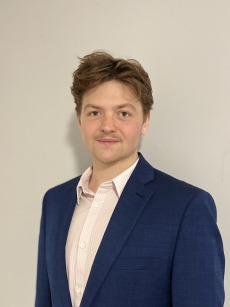
Javier Davis completed a logic model prioritization for the renovation projects on property of a non-profit organization.
Why did you choose this particular internship?
I chose this internship for two main reasons. The first reason is that this opportunity was the perfect intersection of the applied humanities and real estate. Those are the two focuses of my college career, so when I heard about the opportunity at Villa Comunitaria, I knew it would be a perfect fit. I would get to learn about city grants, including how property renovations are accomplished with grant money, and improve my project management skills.
The second reason I chose this organization is that it supports Latinx families in accessing basic social services and provides them with a community hub to meet their neighbors and feel like a part of their community. These aspects of the organization resonate with me because I am a quarter Mexican, and I have a large Mexican family living here in the United States. A core part of my upbringing was the story of my great-grandparents' journey as migrant farmworkers in rural Wyoming to becoming successful business owners in Seattle. My great-grandfather had the opportunity to build a business and build enough wealth to ensure my grandma and aunts had a place to live and access to higher education with the assistance he received from the GI bill after he served in World War II. My family history and experience have shaped my belief that it is essential to provide equal opportunities to all kinds of people.
Was there anything unique about your situation that influenced your internship selection?
I originally planned to complete an internship in the spring semester, however I had to pivot after the organization I planned to work with had a change in management. I realized that I was going to have to pivot to complete this internship this summer. My first step in this process was reaching out to my network to explore potential opportunities in real estate that I could pivot to. After reaching out to my network, I got in contact with Analia, one of my family members' close friends. I was able to schedule a meeting with her and she helped me get in contact with the building and operations manager for her non-profit organization. After meeting Jorge, the building manager, I realized that he had tons of valuable information and skills that would directly help me in my future career path.
What new knowledge and skills did you practice and develop in this internship?
I gained valuable insights into the complexities of managing a non-profit organization’s physical space, including collaboration with local governments, meeting grant requirements, and navigating various rules and regulations. I plan to apply what I learned in the for-profit sector as well so I can grow my ability to conduct due diligence and understand how organizations prioritize the projects related to their physical space. I aim to comprehend the distinct challenges within the for-profit sector, as well as the differences between renovating an existing structure and constructing a new one.
How do you hope to build on the skills that you learned this summer?
I look forward to developing my project management skills and ensuring that work is clearly defined, expectations are well-defined, and timelines are transparent to all stakeholders. A project plan makes it much easier to tackle a large body of work because it connects each of the sub-tasks to the bigger picture and is less overwhelming. It is also a great way to stay on track to get things done on time. Additionally, I look forward to developing my ability to communicate and work with a variety of people with different communication and work styles.
How was the internship related to your Applied Humanities degree?
My Applied Humanities degree equipped me with knowledge and skills in business and real estate, complemented by professional skills in intercultural intelligence. My internship aligned perfectly with these focus areas because I was able to apply financial skills from my business courses, research and due diligence skills from my real estate courses in an intercultural environment where members of a diverse community are working together to empower marginalized people through resources and leadership development.
What was the most significant contribution you made?
The most significant contribution I made during my internship at Villa Comunitaria was creating a logic model for Jorge, the buildings and operations manager. I learned from Jorge that the building that houses Villa Comunitaria is classified as a historic building. It was initially built to be a fire station in the late 1800s, but transitioned to be a community hub. Villa Community received a grant earlier this year, and Jorge was tasked with allocating the grant money and prioritizing the renovation order. In addition to this massive project, Jorge also handles payroll and various HR tasks. Because of this, there was an opportunity for me to work with Jorge in creating a logic model to help him prioritize his projects and learn about the real estate side of running a non-profit organization.
What is the impact of your internship experience?
The impact of my internship on me is immeasurable, I was able to gain super valuable insights into the project management process associated with renovating a building, as well as firsthand knowledge of the obstacles associated with renovation work. On top of this, Jorge taught me a great deal about working in a non-profit organization. I learned about the various bureaucratic processes you have to go through to get aid from the city even for small projects like installing new fences around the property. This experience has genuinely contributed to preparation for my future career and strengthened my confidence that this is the professional path I want to pursue after college.

